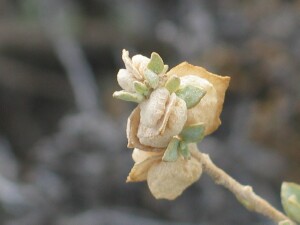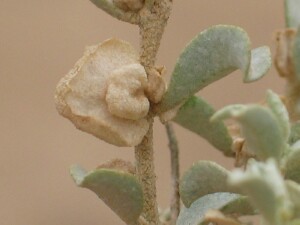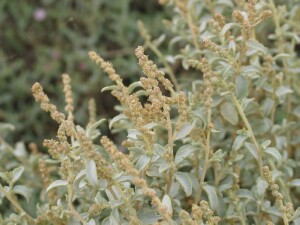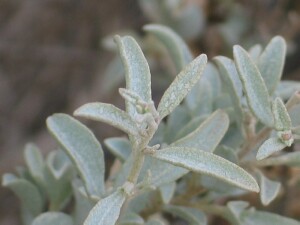Bladder Saltbush
Back | Salinity Indicator Plants Home | Common name home | Scientific name home | Photo Gallery | Glossary
| Brackish Plains Photos | Family: Saltbush (Chenopodiaceae) |
| Scientific Name: | Atriplex vesicaria |  Bladder Saltbush plant Photo: A J Brown | ||||||
Other Common Name: | Perennial Saltbush | |||||||
Status: | Native to inland Australia. | |||||||
Plant Description: | Perennial shrub to 70 cm height and width with brittle woody stems. Leaves are grey-green with a whitish covering to almost completely white, oblong to ovate in shape and 1-2.5 cm long, prominently curved and occasionally toothed, rather thick and very shortly stalked. Plants are dioecious with male flowers on slender dense spikes at the ends of branches and female flowers solitary of few in the leaf axils. The fruiting body is more or less circular, membranous and with a net-work of fine veins, 8-15 mm diameter and concealed by large spongy appendages. | |||||||
Habitat: | Generally found on alluvial plains, sand plains, rocky hills and ridges, Black Box and Mallee communities but reported to have good salt tolerance.
| |||||||
Comments: | High drought tolerance with a tendency to shed leaves to conserve moisture. Male plants not palatable to livestock due to a chemical deterrent. A number of subspecies occur in Victoria, including subsp. macrocystidia, subsp, minor and subsp. variabilis. There are approximately 250 saltbush species around the world and about 45-50 native to Australia. Some species are very similar in appearance but leaf and fruiting body shape are normally used to distinguish them. Most species are tolerant of saline soils but many do not tolerate waterlogging. They derive their name from their ability to take up and store high concentrations of salt in their leaves. | |||||||
 Fruit of Bladder Saltbush Photo: A J Brown |  Fruit of Bladder Saltbush Photo: A J Brown |
|
|
|
|






